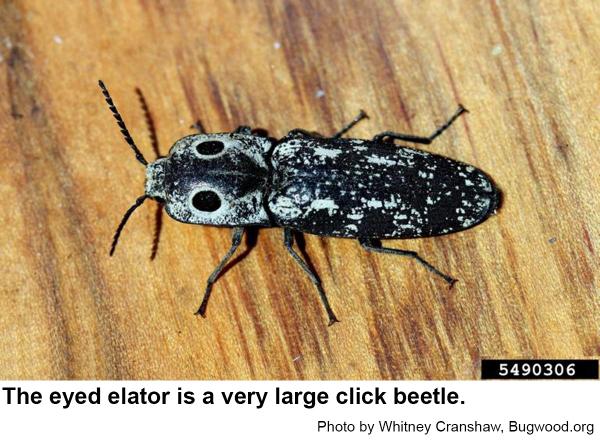Description and Biology
The eyed elator, Alaus oculatus, is a very large click beetle. It is also called the eyed click beetle. Click beetles are so called because of their unusual mechanism for righting themselves when upset. The beetles snap their bodies with an audible click that sends them sailing up into the air more or less like a tiddly wink. The name “elator” is derived from the family Elateridae, the family of click beetles. The “eyed” part of the name refers to large eye spots on the thorax. These large, fake eyes probably scare birds and other predators. These beetles can fly and are sometimes attracted to lights at night. Females lay their eggs in decaying logs and stumps. Immature eyed elators are wireworms that grow to almost two inches long. They have small but functional legs and are slender like earthworms but are smooth, tough, and brown. These wireworms burrow through the rotting wood and feed on grubs and other hapless organisms.
Hosts
Immature eyed elators are large wireworms that develop in decaying logs and stumps by feeding on roundheaded wood borers, grubs and other insects too slow to get out of the way. Adults do not chew on ornamental plants. Furthermore, eyed elators are usually not abundant enough to be considered a pest. It is thought that adult eyed elators may feed on nectar.
Residential Recommendations
Because eyed elators have neutral impact of plants, pets, and people, and because they are relatively rare, no control measures are necessary. Just enjoy them whenever you are lucky enough to see one.
References
- Eyed Elators. Anonymous. No Date.Colorado Insect of Interest.
- Alaus oculatus - Eyed Click Beetle. Bartlett, T. 2004. Bug Guide. Iowa State University Dept. of Entomology.
- Extension Plant Pathology Publications and Factsheets
- Horticultural Science Publications
- North Carolina Agricultural Chemicals Manual
For assistance with a specific problem, contact your local Cooperative Extension Center.
This Factsheet has not been reviewed.
Publication date: May 4, 2016
Reviewed/Revised: Sept. 16, 2019
N.C. Cooperative Extension prohibits discrimination and harassment regardless of age, color, disability, family and marital status, gender identity, national origin, political beliefs, race, religion, sex (including pregnancy), sexual orientation and veteran status.

